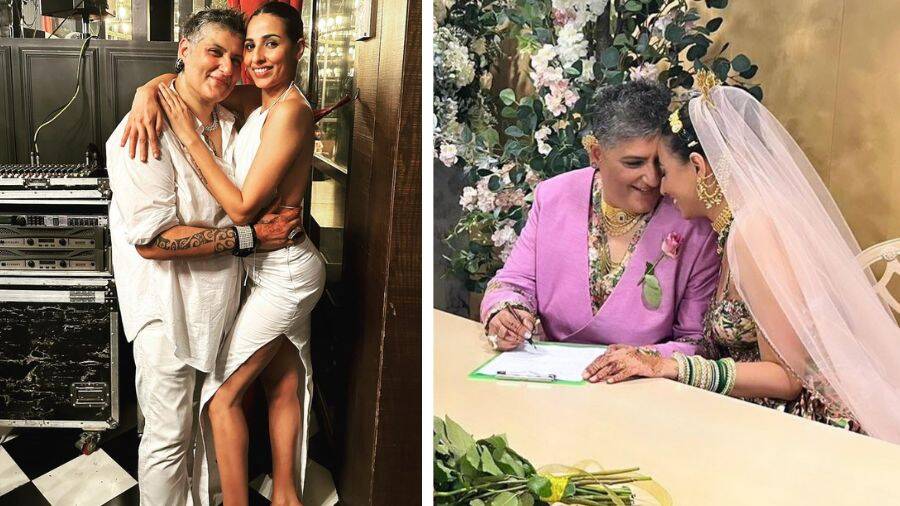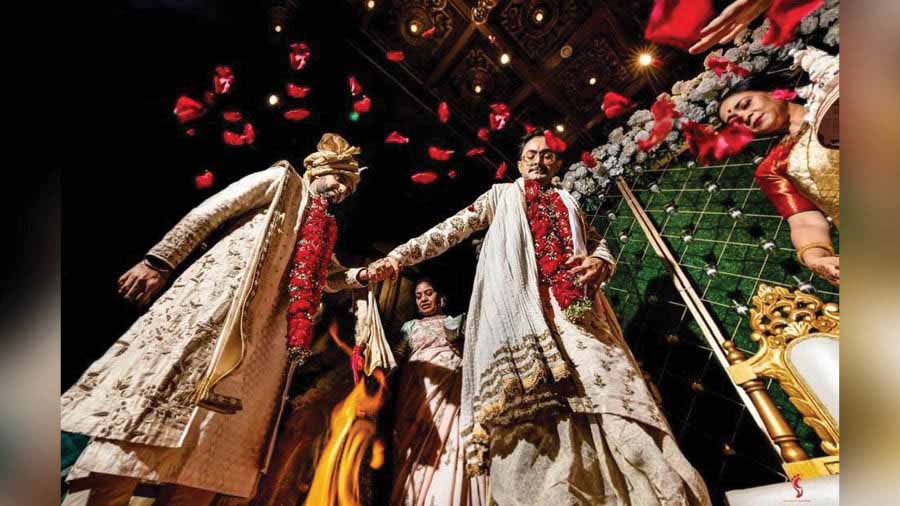One step forward, two steps back is what the recent Supreme Court verdict on same-sex marriage in India feels like for some. The recent ruling did not legalise same-sex marriages in India. The five-judge constitution bench asked the government to set up a committee to examine the rights of queer couples. Transgender and heterosexual couples have the right to marry under the law, but queer couples have no right to adopt.
My Kolkata spoke to DJ and musician Ma Faiza, who recently married her partner, model Anuradha Sharma, in a ceremony in the UK about their thoughts on the verdict.
The two met four years ago and their love story is nothing short of a fairy tale. Faiza came to India in 1990 and fell in love with the country., not knowing then that she would find the woman of her dreams here. Anuradha had spotted Ma Faiza playing at a party in Goa, and built up the courage to give her a tissue with her number. The rest was history.
The two tied the knot in a ceremony in the UK just 10 days ago.
‘We hope that being out and proudly married in India boosts the cause of equal rights’
The couple was heading back to India on October 17, and had dreamed of being able to celebrate a historic judgment from the Supreme Court legalising same-sex marriage. “We are deeply saddened, and appreciate immensely, the privileged opportunity we had to cement our union in a legal same-sex marriage in England just 10 days ago. We recognise that the struggle all of us from the queer community face is still far from over, and we hope that being out and proudly married in India boosts the cause to have equal rights to love and marry any gender. Love is love!” said Ma.
Their same-sex marriage in the UK was one of the few options open for them to “legitimise our love for each other” and allow them equal rights to live together in society proudly as a couple. “We stand with the queer community in the continued fight against a system that denies us equal, legal rights just because we love someone regardless of their gender. The fight is not over,” the musician added.
‘It took us a really long time to get married, even in the UK’
The couple had two options in the UK — a civil partnership or a marriage, both of which are recognised in the UK and some other countries. They converted their civil partnership to a marriage since they were told that few more countries recognised a same-sex marriage in the UK rather than a same-sex civil partnership.
“We chose to get married and it took us a really long time. We spoke to lawyers, we spent a lot of money, and for one year, we were compiling the paperwork for our relationship. We submitted our application with 1,100 pieces of paper. The flight tickets, we had to be living together for two years, 50 screenshots of our messages, emails, emails, travels together, comments from people wishing us well for every month we have been together... we had to prove it all!”
If they were a heterosexual couple getting married in India, they could get Anuradha a spouse visa and she “would come to England, already married, and be my spouse,” said Ma. Instead, Anuradha went to the UK on a marriage visa. It was a long and expensive process, but they wanted to be legally recognised and “have equality where we could.” Since Ma has a British passport, the UK was their destination of choice, but both feel it is equally important to be in India and be married.
‘We have the same rights as a heterosexual couple in the UK’
The newlyweds have the same rights as any heterosexual couple would in the UK. “If we divorce, there is already an equal share, we have medical insurance and financial planning. Home co-signing, mortgage, nominees, bank accounts — everything that we are struggling with,” said Ma, adding that Anuradha can be a nominee on her investments by virtue of being her spouse.
In India, however, it’s not the same. They have a joint account and live together, but they are not legally spouses. “If something were to happen to me, they would question it and say ‘she is not your wife, you can’t be married’. We have a marriage document, but it’s not relevant,” said Ma.
‘There is a lot of momentum and things will change’
The couple heard about the Indian ruling in the UK and were disappointed. “We both cried. Anuradha had a lot more hope. I told her that the Supreme Court is not there to create laws, it is only there to interpret them. It did the same with the reading down of 377, and said ‘we can’t make it legal but we can refer it to Parliament’.”
Despite the fact that marriage equality has not been recognised, there’s reason for hope, feels the DJ. The fact that there is visibility and a discourse is “amazing”. “I say amazing because all of this has happened in a seemingly short time. I have been here for 30 years and it’s only in the last about eight years that we have been able to talk about the LGBTQIA+ community in any meaningful way. There is a lot of momentum and things will change," she signed off.

